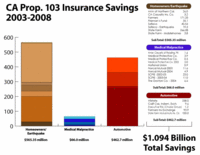Today is Deadline for New Auto Insurance Pricing System Based on Driving Record Not ZIP Code
20 Years After Vote, Insurers Must Show They are Complying With Prop 103 Rules
SANTA MONICA, Calif., July 14 /PRNewswire-USNewswire/ -- Today is the deadline for every auto insurer in the state to submit new plans to the Insurance Commissioner detailing a new rate setting system that complies with the rules of the landmark 1988 insurance reform initiative Proposition 103. Auto insurance companies in California must now set customers' premiums primarily on driving record and the number of miles driven annually and significantly limit the impact of ZIP Code on rates.
"If you have a good driving record, you shouldn't be forced to pay hundreds and even thousands of dollars more for auto insurance just because of your ZIP Code, and finally you won't have to," said Harvey Rosenfield, the author of Proposition 103. "For 20 years, the insurance industry stymied the will of the voters who passed Prop 103, but today the insurance companies' defiance comes to an end and Californians will be charged according to how well and how much they drive, not where they live."
Under the terms of Proposition 103, and regulations issued by the Insurance Commissioner in 2006, each auto insurance company must submit a special application to the Department of Insurance showing that it is complying with the new rules. In August of 2006, companies were given two years to phase in the new safety record-based system. A few companies have already completed the changeover, but the vast majority of insurers have not fully converted. The new compliance filings will be reviewed by the Department of Insurance -- and Consumer Watchdog's lawyers. They are expected to take effect in the early autumn.
Good Drivers Will No Longer Pay Hundreds of Dollars More Than Neighbors Across the Street and One ZIP Code Away
For generations, drivers in certain neighborhoods paid dramatically more than people living just across the ZIP Code line, because of insurers' reliance on geography in premium setting.
For example, until these rules changed, one leading insurer charged an annual premium of $930 for standard liability coverage for a policyholder living on the south side of El Segundo Boulevard in Los Angeles (on the 90247 side of the street), but charged 53% more, a $500 increase, to a customer who lived across the street in LA 90044.
And the differences became more extreme with just a small distance between the policyholders.
Under the old system even basic liability-only insurance was priced with dramatic differences for good drivers living in different ZIP Codes:
-- North Hollywood drivers paid about 40% more than drivers who live in Burbank
-- South Los Angeles drivers paid about 63% more than drivers living in Palos Verdes
-- Auto insurance cost 20% more in Vista (in northern San Diego County) than in the La Jolla neighborhood of San Diego
Under the old system good drivers could pay more than other customers who caused accidents, because of ZIP Code. In one example, a major insurer charged a driver with a perfect record who lived in San Leandro, south of Oakland, 23% more than a driver with an at-fault accident on their record who lived over the hills in Walnut Creek.
New rules diminish, but do not end insurance company use of ZIP Codes
Under the plans that insurers are submitting today, a driver's record, the annual miles they drive and the number of years they have been licensed must each have a greater impact on insurance premiums than ZIP Code or such other factors as marital status, which has historically had a major impact on premiums. There will, therefore, still be geographic variation in premiums, but not nearly of the scale described in the examples above. Further, drivers who have historically been overcharged solely because of their address will see the most significant relief.
New rate plans also due today
As part of the 2006 regulations, all insurers were required to adjust their overall rate levels in conjunction with submitting new pricing plans, and those rate filings are also due today. Consumer advocates say that auto insurance rates in California should be coming down generally and will study company rate filings to ensure they follow Proposition 103's strict rules against excessive insurance rates. Under Proposition 103, consumer groups may challenge any rate plan that appears to be excessive, inadequate or unfairly discriminatory and Consumer Watchdog has vowed to call for investigations into any rate change that doesn't result in appropriate prices for customers.
"No matter where you live, you shouldn't be forced to overpay for auto insurance," said Consumer Watchdog's litigation director Pamela Pressley. "We have successfully challenged many efforts by insurance companies to overcharge their customers and we will be especially vigilant this summer as hundreds of companies propose new rate plans."
Challenges of excessive rates under Proposition 103 by Consumer Watchdog have saved motorists in California more than $450 million over the past five years.



